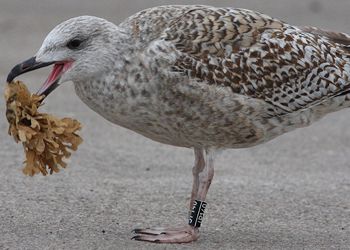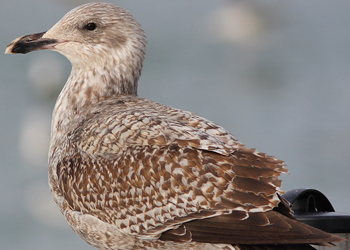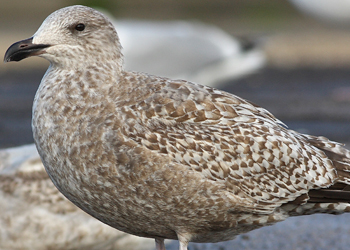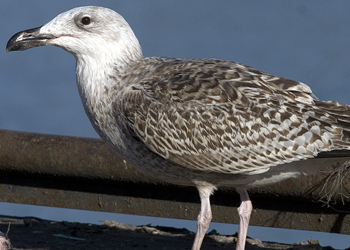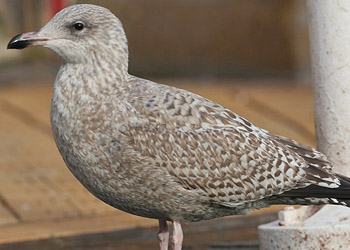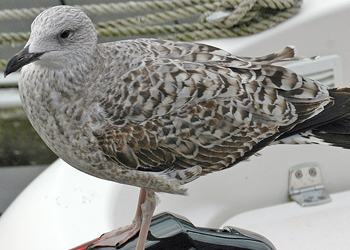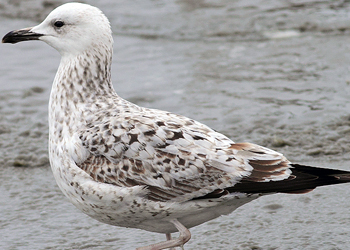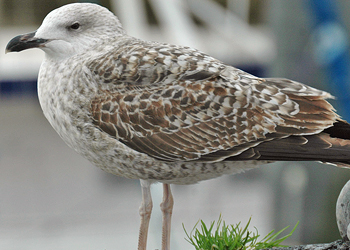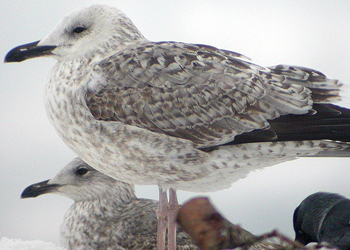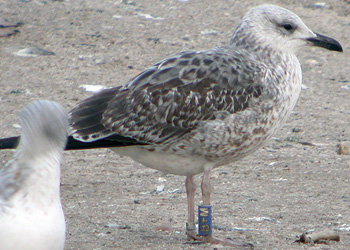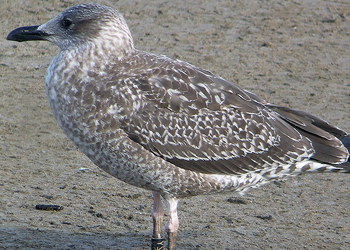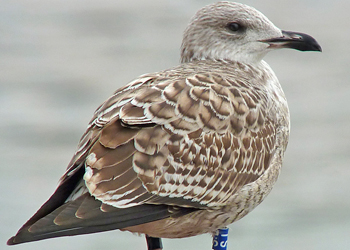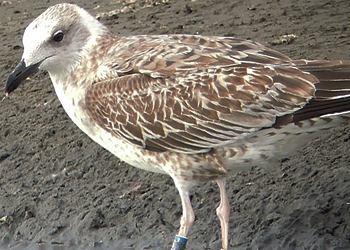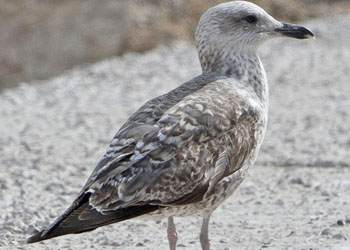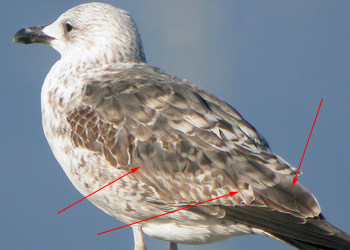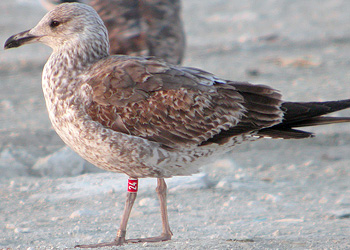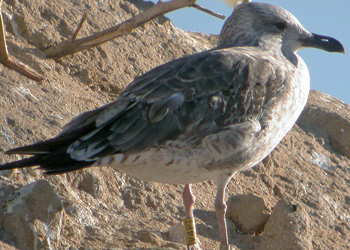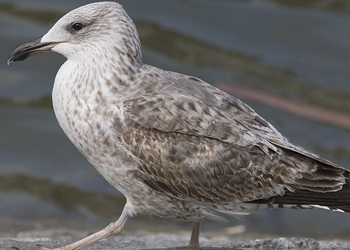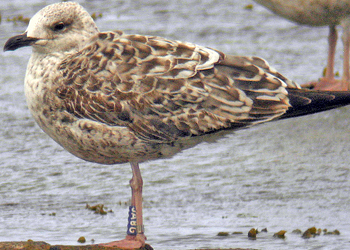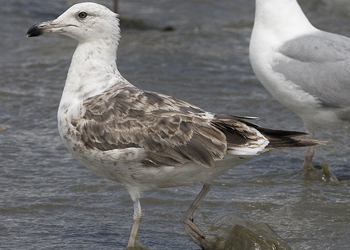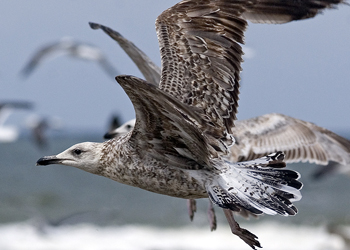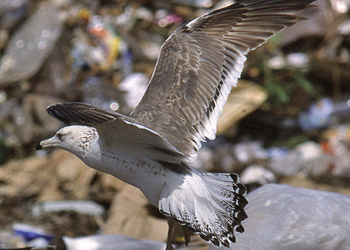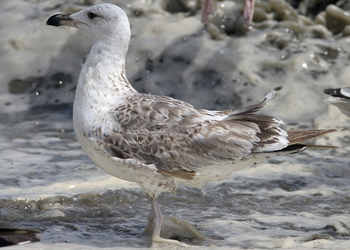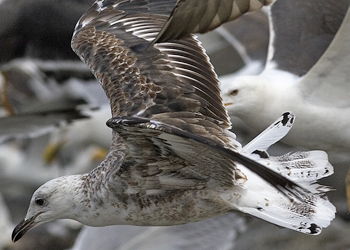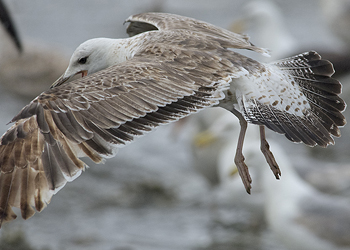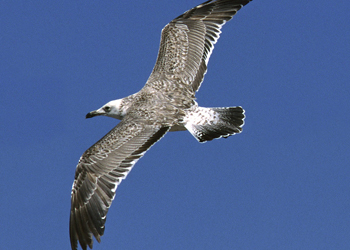 Lesser Black-backed Gull (graellsii & intermedius)
Lesser Black-backed Gull (graellsii & intermedius)
(last update:
lbbg 1cy May
lbbg 1cy June
lbbg 1cy July
lbbg 1cy August
lbbg 1cy September
lbbg 1cy October
lbbg 1cy November
lbbg 1cy December
lbbg 2cy January
lbbg 2cy February
lbbg 2cy Mar-April
lbbg 2cy May
lbbg 2cy June
lbbg 2cy July
lbbg 2cy August
lbbg 2cy September
lbbg 2cy October
lbbg 2cy Nov - Dec
lbbg 3cy Jan-April
lbbg 3cy May
lbbg 3cy June
lbbg 3cy July
lbbg 3cy August
lbbg 3cy September
lbbg 3cy October
lbbg 3cy Nov - Dec
lbbg sub-ad Jan-April
lbbg sub-ad May
lbbg sub-ad June
lbbg sub-ad July
lbbg sub-ad Aug
lbbg sub-ad Sept
lbbg sub-ad Oct
lbbg sub-ad Nov
lbbg sub-ad Dec
lbbg adult January
lbbg adult February
lbbg adult March
lbbg adult April
lbbg adult May
lbbg adult June
lbbg adult July
lbbg adult August
lbbg adult September
lbbg adult October
lbbg adult Nov - Dec
second calendar year: February
Normally, LBBG do not winter in the Netherlands, but depending on winter conditions some may stay in the most south-western point of our country at Westkapelle, Zeeland. Most LBBG present are believed to belong to the race intermedius originating from Denmark to Norway (Vest-Agder). Nevertheless, some local Dutch graellsii -of the type 'Dutch intergrade'- may stay during winter as well, as Dutch colour-ringed individuals showed in winter 2000/2001 at Westkapelle and IJmuiden, near Amsterdam (see distribution maps for locations).
In many plumages, the on average darker intermedius are hard to distinguish from graellsii with certainty so unringed birds can maybe best called LBBG. Most LBBG present in January are adults, but some sub-adults, first and second winters can be seen as well.
In spring, the large groups of LBBG that arrive, contain almost no 2cy birds. By March, adults (probably males) are the first to return to the colonies to occupy the nesting sites, and ring recoveries show there is a strong site fidelity (birds trying to get the exact same spot to build the nest as they did the previous year). By the end of the month, just a few immature LBBG are seen. Throughout May, most 2cy LBBG can be found in large migrating flocks.
Post-juvenile moult in LBBG
The post-juvenile moult in large white-headed gulls in Europe is variable among the species. "The standard" post-juvenile moult is set by Herring Gull (Larus argentatus) and Great Black-backed Gull (L. marinus). These species have a rather restricted post-juvenile moult. Juvenile birds from southern populations normally replace scapulars before the end of the calendar year. They do not include any tertials, wing-coverts or flight feathers in this post-juvenile moult (about 1-2% do replace single wing-coverts; it's a matter of definition if this should be interpreted as 'moult', as it is often not symmetric in the wings). Birds from northern populations often remain in completely juvenile plumage, except for a few small upper scapulars that will be replaced for 2nd generation feathers. However, ringed birds with northern origin sometimes follow a southern moult timing as well. A few illustrations of this "Herring Gull standard" below:
The gulls depicted above are all example birds with limited post-juvenile moult (no coverts, no tertials, no flight feathers), which is the standard in Herring Gull and Great Black-backed Gull. Two other taxa hatch slightly earlier in the season, and both have a more extensive post-juvenile moult: Caspian Gull (L. cachinnans) and Yellow-legged Gull (L. michahellis). Both species have all scapulars replaced by mid November (except for the odd retarded bird, or relatively late moulting subspecies e.g. L. m. lusitanius). By the end of the year, cachinnans and michahellis have all scapulars replaced, and many birds also replace wing-coverts and tertials in the post-juvenile moult of their hatch year. Moulting wing-coverts or tertials make these birds different from the Herring Gull standard. A few example birds below:
Both Caspian and Yellow-legged Gull are early hatching and fletching species, in which the post-juvenile moult starts early in the season. The end of this post-juvenile moult is reached by mid-November. After this date, its normally only a low pace progress in scapular replacement that continues; there will be no new moult gaps in the wing-coverts nor in the tertials. This time schedule is important to remember when dealing with Lesser Black-backed Gull subspecies; western taxon graellsii can match to the schedule of michahellis (albeit slightly -4 weeks- later, but still before the end of the year), while Scandinavian taxa intermedius and fuscus are much later in post-juvenile moult commencement.
In short, it is possible to observe 2CY graellsii and 2CY intermedius side-by-side in N Europe in May or June, both birds looking pretty much the same regarding feather replacement, but the wear in the fringes is completely different. Graellsii replaced wing-coverts early in the winter (October-November), while many intermedius moult these same feather tracts much later, in March-April. Consequently, intermedius looks much tidier and neat in June, where graellsii has a more bleached and worn plumage.
There is a tendency to a west-northeast cline regarding extent of the post-juvenile moult. Many of the 2CY April graellsii (ringed birds) on this website show the standard Herring Gull post-juvenile moult: replaced scapulars, but retained juvenile wing-coverts, juvenile tertials and flight feathers. Some graellsii do look more advanced, like the last 2CY graellsii bird from April 27 in Dordrecht, but still most juvenile in its plumage.
The group of ringed intermedius from April also includes some "standard Herring Gull moult strategies" birds, but many birds show more advanced moult. Midway this spectrum are birds with upper tertials replaced, and most of the (visible) inner wing-coverts replaced for 2nd gen, as illustrated by the intermedius 2CY bird from May 09 Simrishamn. The far end of the spectrum contains birds illustrated in the table below: all scapulars replaced, most wing-coverts replaced, all rectrices replaced and even a variable number of secondaries moulted to 2nd gen.
So far, we never encountered ringed 2CY intermedius in spring with replaced primaries. Of course, in western Europe we have records of spring birds with replaced primaries, which looked odd for nominate fuscus (reference for fuscus is birds from S Finland), but unfortunately such birds in western Europe were never ringed, hence no provenance on origin.
From the data on ringed birds, it appears there is a large variation in moult extent in intermedius. This large variation is shared by the eastern cousin 'heuglini'. Visa Rauste photographed a large group of 2CY Lesser Black-backed Gull heuglini, in June in N Russia. The overall appearance and moult strategy in heuglini is remarkable similar to that of intermedius. Except for one (key) difference: quite commonly heuglini include some to many primaries in the post-juvenile moult on the wintering grounds (moult prior to migration). The table below shows a selection of the most advanced 2CY spring intermedius type of birds recorded in western Europe, together with 2CY heuglini birds from the group photographed by Visa. All birds observed in June.
LBBG from the U.K.: 2cy graellsii
.
 LBBG R8RJ February 16 2007, Anza-Agadir, Morocco. Picture: Morten Helberg.
LBBG R8RJ February 16 2007, Anza-Agadir, Morocco. Picture: Morten Helberg. LBBG WB7P February 16 2007, Anza-Agadir, Morocco. Picture: Morten Helberg.
LBBG WB7P February 16 2007, Anza-Agadir, Morocco. Picture: Morten Helberg. LBBG WC4F February 14 2007, harbour Agadir, Morocco. Picture: Morten Helberg.
LBBG WC4F February 14 2007, harbour Agadir, Morocco. Picture: Morten Helberg. LBBG WC9F February 14 2007, Anza-Agadir, Morocco. Picture: Morten Helberg.
LBBG WC9F February 14 2007, Anza-Agadir, Morocco. Picture: Morten Helberg.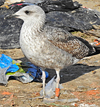 Lesser Black-backed Gull graellsii T14M 2CY, February 06 & March 06 2016, Comenar Viejo, Madrid, Spain (40°15'41"N 003°38'00"W). Picture: Delfín Gonzalez.
Lesser Black-backed Gull graellsii T14M 2CY, February 06 & March 06 2016, Comenar Viejo, Madrid, Spain (40°15'41"N 003°38'00"W). Picture: Delfín Gonzalez. Lesser Black-backed Gull graellsii 078:F 2CY, February 07 2017, Aguda beach, V.N.Gaia, Portugal. Picture: José Marques.
Lesser Black-backed Gull graellsii 078:F 2CY, February 07 2017, Aguda beach, V.N.Gaia, Portugal. Picture: José Marques. Lesser Black-backed Gull graellsii 1CP5 2CY, January - March 2015, Matosinhos Beach, Matosinhos, Portugal. Picture: José Marques.
Lesser Black-backed Gull graellsii 1CP5 2CY, January - March 2015, Matosinhos Beach, Matosinhos, Portugal. Picture: José Marques. Lesser Black-backed Gull graellsii 4CL9 2CY, Februray 10 2015, Matosinhos Beach, Matosinhos, Portugal. Picture: José Marques.
Lesser Black-backed Gull graellsii 4CL9 2CY, Februray 10 2015, Matosinhos Beach, Matosinhos, Portugal. Picture: José Marques. Lesser Black-backed Gull graellsii 5CS5 1CY-3CY, December 2014 - July 2016, Praia de Mira, Coimbra, Portugal. Picture: José Marques.
Lesser Black-backed Gull graellsii 5CS5 1CY-3CY, December 2014 - July 2016, Praia de Mira, Coimbra, Portugal. Picture: José Marques.  Lesser Black-backed Gull graellsii 6FK9 2CY, February - March 2017, Aguda beach - Gaia, Portugal. Picture: José Marques.
Lesser Black-backed Gull graellsii 6FK9 2CY, February - March 2017, Aguda beach - Gaia, Portugal. Picture: José Marques. Lesser Black-backed Gull graellsii 8FJ4 2CY, January - March 2017, Matosinhos beach, Matosinhos, Portugal. Picture: José Marques.
Lesser Black-backed Gull graellsii 8FJ4 2CY, January - March 2017, Matosinhos beach, Matosinhos, Portugal. Picture: José Marques. Lesser Black-backed Gull graellsii 9FF3 2CY-3CY, January 2016 - March 2017, Matosinhos, Portugal. Picture: José Marques.
Lesser Black-backed Gull graellsii 9FF3 2CY-3CY, January 2016 - March 2017, Matosinhos, Portugal. Picture: José Marques. LBBG 1TF February 26 2011, Malaga, Spain. Picture: Gabriel Martin.
LBBG 1TF February 26 2011, Malaga, Spain. Picture: Gabriel Martin. Lesser Black-backed Gull graellsii P+Y 2CY, February 07 2017, Aguda beach - Gaia, Portugal. Picture: José Marques.
Lesser Black-backed Gull graellsii P+Y 2CY, February 07 2017, Aguda beach - Gaia, Portugal. Picture: José Marques. LBBG AJ.AH January-March 2009, Madrid, Spain. Photo by Delfín González.
LBBG AJ.AH January-March 2009, Madrid, Spain. Photo by Delfín González. Lesser Black-backed Gull graellsii NLNB 2CY, January - March 2015, Matosinhos, Portugal. Picture: José Marques.
Lesser Black-backed Gull graellsii NLNB 2CY, January - March 2015, Matosinhos, Portugal. Picture: José Marques.LBBG from France: 2cy graellsii
.
 Lesser Black-backed Gull graellsii 3:DNR 1CY-2CY, September - March 2017, Matosinhos beach, Matosinhos, Portugal. Picture: José Marques.
Lesser Black-backed Gull graellsii 3:DNR 1CY-2CY, September - March 2017, Matosinhos beach, Matosinhos, Portugal. Picture: José Marques. LBBG 263N February 16 2007, Anza-Agadir, Morocco. Picture: Morten Helberg.
LBBG 263N February 16 2007, Anza-Agadir, Morocco. Picture: Morten Helberg. LBBG 308N February 16 2007, Anza-Agadir, Morocco. Picture: Morten Helberg.
LBBG 308N February 16 2007, Anza-Agadir, Morocco. Picture: Morten Helberg. LBBG 330N February 16 2007, Anza-Agadir, Morocco. Picture: Morten Helberg.
LBBG 330N February 16 2007, Anza-Agadir, Morocco. Picture: Morten Helberg. LBBG 338N February 14 2007, Anza-Agadir, Morocco. Picture: Morten Helberg.
LBBG 338N February 14 2007, Anza-Agadir, Morocco. Picture: Morten Helberg. LBBG 420N February 12 2007, harbour Agadir, Morocco. Picture: Morten Helberg.
LBBG 420N February 12 2007, harbour Agadir, Morocco. Picture: Morten Helberg. LBBG 588N February 14 2007, Anza-Agadir, Morocco. Picture: Morten Helberg.
LBBG 588N February 14 2007, Anza-Agadir, Morocco. Picture: Morten Helberg.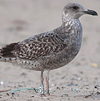 Lesser Black-backed Gull graellsii R:V7N 1CY-3CY, December 2014 - October 2016, Matosinhos beach, Matosinhos, Portugal. Picture: José Marques.
Lesser Black-backed Gull graellsii R:V7N 1CY-3CY, December 2014 - October 2016, Matosinhos beach, Matosinhos, Portugal. Picture: José Marques.LBBG from Belgium: 2cy graellsii "Dutch intergrade"
.
 LBBG DVAG February 16 2007, Anza-Agadir, Morocco. Picture: Morten Helberg.
LBBG DVAG February 16 2007, Anza-Agadir, Morocco. Picture: Morten Helberg. LBBG DWAK February 16 2007, Anza-Agadir, Morocco. Picture: Morten Helberg.
LBBG DWAK February 16 2007, Anza-Agadir, Morocco. Picture: Morten Helberg. LBBG GNAN February 23 2008, Ciudad Real, Spain. Picture: Gabriel Martín.
LBBG GNAN February 23 2008, Ciudad Real, Spain. Picture: Gabriel Martín. LBBG GYAF February 23 2008, Ciudad Real, Spain. Picture: Gabriel Martín.
LBBG GYAF February 23 2008, Ciudad Real, Spain. Picture: Gabriel Martín. LBBG NFAZ February 26 2011, Malaga, Spain. Picture: Gabriel Martin.
LBBG NFAZ February 26 2011, Malaga, Spain. Picture: Gabriel Martin.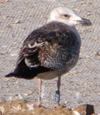 LBBG TCAC 1cy-2cy, December 2011 - February 2012, Madrid, Spain. Picture: Delfín González.
LBBG TCAC 1cy-2cy, December 2011 - February 2012, Madrid, Spain. Picture: Delfín González.LBBG from the Netherlands: 2cy graellsii "Dutch intergrade"
.
 Lesser Black-backed Gull graellsii J3 2CY, January -June & October 2016, Douro River Estuary, Porto, Portugal. Picture: José Marques.
Lesser Black-backed Gull graellsii J3 2CY, January -June & October 2016, Douro River Estuary, Porto, Portugal. Picture: José Marques. LBBG TE February 16 2007, Anza-Agadir, Morocco. Picture: Morten Helberg.
LBBG TE February 16 2007, Anza-Agadir, Morocco. Picture: Morten Helberg. LBBG TW February 12 2007, harbour Agadir, Morocco. Picture: Morten Helberg.
LBBG TW February 12 2007, harbour Agadir, Morocco. Picture: Morten Helberg. LBBG YZ February 23 2008, Ciudad Real, Spain. Picture: Gabriel Martín.
LBBG YZ February 23 2008, Ciudad Real, Spain. Picture: Gabriel Martín. LBBG 41 February 25 2007, Madrid, Spain. Picture: Delfín González.
LBBG 41 February 25 2007, Madrid, Spain. Picture: Delfín González. LBBG 8C February 08 2009, Madrid, Spain. Picture: Delfín González. Also as 3cy.
LBBG 8C February 08 2009, Madrid, Spain. Picture: Delfín González. Also as 3cy. LBBG P6 February 28 2009, Ciudad Real, Spain. Picture: Gabriel Martín.
LBBG P6 February 28 2009, Ciudad Real, Spain. Picture: Gabriel Martín.  LBBG S2 February 17 2008, Madrid, Spain. Picture: Delfín González. Also see in Sept 2008.
LBBG S2 February 17 2008, Madrid, Spain. Picture: Delfín González. Also see in Sept 2008. LBBG ZK February 07 2006, NE Spain. Picture: Chris Gibbins.
LBBG ZK February 07 2006, NE Spain. Picture: Chris Gibbins.  LBBG S4 February 07 2010, Tarragona, Spain. Picture: Albert Cama Torrell.
LBBG S4 February 07 2010, Tarragona, Spain. Picture: Albert Cama Torrell. LBBG KHAV February 28 2009, Ciudad Real, Spain. Picture: Gabriel Martín.
LBBG KHAV February 28 2009, Ciudad Real, Spain. Picture: Gabriel Martín. LBBG PCAX February 14 2007, Anza-Agadir, Morocco. Picture: Morten Helberg.
LBBG PCAX February 14 2007, Anza-Agadir, Morocco. Picture: Morten Helberg. LBBG PCCU February 12 2007, harbour Agadir, Morocco. Picture: Morten Helberg.
LBBG PCCU February 12 2007, harbour Agadir, Morocco. Picture: Morten Helberg. LBBG YADY February 28 2009, Ciudad Real, Spain. Picture: Gabriel Martín.
LBBG YADY February 28 2009, Ciudad Real, Spain. Picture: Gabriel Martín.  LBBG 5.412.154 February 10-18 2004, IJmuiden, the Netherlands (52.27N,04.33E).
LBBG 5.412.154 February 10-18 2004, IJmuiden, the Netherlands (52.27N,04.33E).LBBG ringed in winter: 2cy graellsii
.
 LBBG N369 February 07 2006, NE Spain. Picture: Chris Gibbins.
LBBG N369 February 07 2006, NE Spain. Picture: Chris Gibbins.LBBG from the N Germany:
2cy transition graellsii - intermedius
.
 LBBG Hxxx February 16 2007, Anza-Agadir, Morocco. Picture: Morten Helberg.
LBBG Hxxx February 16 2007, Anza-Agadir, Morocco. Picture: Morten Helberg. LBBG H057 February 03 2008, Madrid, Spain. Picture: Delfín González.
LBBG H057 February 03 2008, Madrid, Spain. Picture: Delfín González. LBBG H077 January 26 - February 03 2009, Champteussé-sur-Baconne, SW France. Picture: Alain Fosse.
LBBG H077 January 26 - February 03 2009, Champteussé-sur-Baconne, SW France. Picture: Alain Fosse. LBBG H490 February 25 2008, La Séguinière, SW France. Picture: Alain Fosse.
LBBG H490 February 25 2008, La Séguinière, SW France. Picture: Alain Fosse. LBBG H585 February 23 2008, Ciudad Real, Spain. Picture: Gabriel Martín.
LBBG H585 February 23 2008, Ciudad Real, Spain. Picture: Gabriel Martín. LBBG H66A February 18 2007, Madrid, Spain. Picture: Delfín González.
LBBG H66A February 18 2007, Madrid, Spain. Picture: Delfín González. LBBG H99K February 14 2007, Anza-Agadir, Morocco. Picture: Morten Helberg.
LBBG H99K February 14 2007, Anza-Agadir, Morocco. Picture: Morten Helberg.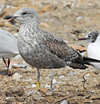 Lesser Black-backed Gull HECJ0 2CY, February 28 2016, Comenar Viejo, Madrid, Spain (40°15'41"N 003°38'00"W). Picture: Delfín Gonzalez.
Lesser Black-backed Gull HECJ0 2CY, February 28 2016, Comenar Viejo, Madrid, Spain (40°15'41"N 003°38'00"W). Picture: Delfín Gonzalez. Lesser Black-backed Gull HECT9 2CY, February 28 2016, Comenar Viejo, Madrid, Spain (40°15'41"N 003°38'00"W). Picture: Delfín Gonzalez.
Lesser Black-backed Gull HECT9 2CY, February 28 2016, Comenar Viejo, Madrid, Spain (40°15'41"N 003°38'00"W). Picture: Delfín Gonzalez. Lesser Black-backed Gull HEP78 2CY, February 06 2016, Comenar Viejo, Madrid, Spain (40°15'41"N 003°38'00"W). Picture: Delfín Gonzalez.
Lesser Black-backed Gull HEP78 2CY, February 06 2016, Comenar Viejo, Madrid, Spain (40°15'41"N 003°38'00"W). Picture: Delfín Gonzalez. Lesser Black-backed Gull graellsii HN53H 2CY, Februray 13 2015, Matosinhos beach, Matosinhos, Portugal. Picture: José Marques.
Lesser Black-backed Gull graellsii HN53H 2CY, Februray 13 2015, Matosinhos beach, Matosinhos, Portugal. Picture: José Marques.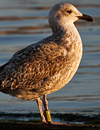 Lesser Black-backed Gull graellsii HX0C3 2CY, Februray 09 2015, Leixões harbour, Matosinhos, Portugal. Picture: José Marques.
Lesser Black-backed Gull graellsii HX0C3 2CY, Februray 09 2015, Leixões harbour, Matosinhos, Portugal. Picture: José Marques. Lesser Black-backed Gull HX6C3 2CY, February 01 2015, Comenar Viejo, Madrid, Spain (40°15'41"N 003°38'00"W). Picture: Delfín Gonzalez.
Lesser Black-backed Gull HX6C3 2CY, February 01 2015, Comenar Viejo, Madrid, Spain (40°15'41"N 003°38'00"W). Picture: Delfín Gonzalez. LBBG H210 February 03 2009, Champteussé-sur-Baconne, SW France. Picture: Alain Fosse.
LBBG H210 February 03 2009, Champteussé-sur-Baconne, SW France. Picture: Alain Fosse. Lesser Black-backed Gull H64T 2CY, February 14 2016, Comenar Viejo, Madrid, Spain (40°15'41"N 003°38'00"W). Picture: Delfín Gonzalez.
Lesser Black-backed Gull H64T 2CY, February 14 2016, Comenar Viejo, Madrid, Spain (40°15'41"N 003°38'00"W). Picture: Delfín Gonzalez.LBBG from Denmark: 2cy intermedius
.
LBBG from S. Norway: 2cy intermedius
.
 LBBG J2HJ February 23 2008, Ciudad Real, Spain. Picture: Gabriel Martín.
LBBG J2HJ February 23 2008, Ciudad Real, Spain. Picture: Gabriel Martín. Lesser Black-backed Gull intermedius J091N 2CY, February 06 2016, Comenar Viejo, Madrid, Spain (40°15'41"N 003°38'00"W). Picture: Delfín Gonzalez.
Lesser Black-backed Gull intermedius J091N 2CY, February 06 2016, Comenar Viejo, Madrid, Spain (40°15'41"N 003°38'00"W). Picture: Delfín Gonzalez.  Lesser Black-backed Gull intermedius J221N 2CY, January-April & November 2016, Matosinhos Beach, Matosinhos, Portugal. Picture: José Marques.
Lesser Black-backed Gull intermedius J221N 2CY, January-April & November 2016, Matosinhos Beach, Matosinhos, Portugal. Picture: José Marques. Lesser Black-backed Gull intermedius J696Z 2CY, February - March 2017, Matosinhos, Portugal. Picture: José Marques.
Lesser Black-backed Gull intermedius J696Z 2CY, February - March 2017, Matosinhos, Portugal. Picture: José Marques. Lesser Black-backed Gull intermedius J965Z 2CY, February 07 2017, Aguda beach - Gaia, Portugal. Picture: José Marques.
Lesser Black-backed Gull intermedius J965Z 2CY, February 07 2017, Aguda beach - Gaia, Portugal. Picture: José Marques. LBBG J25L February 23 2008, Ciudad Real, Spain. Picture: Gabriel Martín.
LBBG J25L February 23 2008, Ciudad Real, Spain. Picture: Gabriel Martín. LBBG JP76 February 16 2007, Anza-Agadir, Morocco. Picture: Morten Helberg.
LBBG JP76 February 16 2007, Anza-Agadir, Morocco. Picture: Morten Helberg.